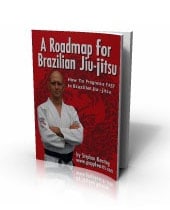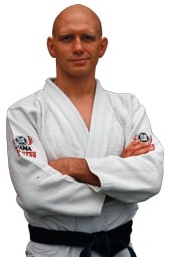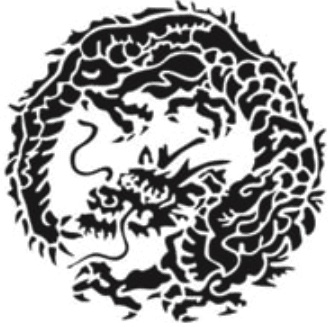
In my late twenties I went through a phase that most young men go through – I wanted to get big. Maybe not as big as Dorian Yates and the other professional bodybuilders active at the time, but certainly bigger than most other men in my peer group. Yes, I admit that there was a certain element of vanity at work, but I also told myself that it would be good for my jiu-jitsu.
The trouble was that despite lifting weights I wasn’t putting on size very easily. I had been stuck at a plateau of 205 lbs to 210 lbs for a while.
In the back of my mind I had a very specific goal with all this weightlifting: I wanted to make it to 240 lbs, still have visible abs (i.e. not be fat), and do it without steroids.
I devoured the bodybuilding ‘literature’ to learn about supplements, diets and exercise tips. Some of it was useful, but most of it was pure hype. Articles about diet by big name bodybuilders (actually ghost-written by the Muscle and Fitness staff writers) would advocate eating chicken breasts, broccoli and cottage cheese, but then someone would report that they’d seen this same bodybuilder gobbling down Big Macs at MacDonalds.
I took a TON of useless vitamins, minerals and supplements, the main effect of which was making my urine much more expensive.
But in the end it was an experienced bodybuilder who gave me the straight dope…
He said that there were three things that made the professionals as big as they were. In order of importance they were:
- Big doses of steroids
- Big eating
- Big lifting
I had known that steroids were an important part of the equation. But it was kind of shocking how the actual weightlifting itself was less important than both the steroids and food. That revelation really rocked my world.
Since I wanted to reach my goal naturally I had to rule out steroids. That left diet and exercise…
Let’s talk first about the weightlifting itself.
I started lifting more, and heavier. I tried all kinds of routines: long sessions, short sessions, split routines, circuits, etc.
In the end I found the biggest gains came from the big compound lifts like the squat, bench press, dips and weighted pullups, supplemented with more conventional bodybuilding exercises like bicep curls, leg extensions, calf raises etc.
As a result of all this heavy lifting I was sore much of the time. Getting up out of a chair after a heavy leg day was its own special brand of agony. And trying to do even half the pushups in Marcus Soares’ killer bodyweight BJJ ‘warmup’ routine after chest day was essentially impossible. But I learned to enjoy the pain – it was evidence that I was working hard in the gym.
But the real game-changer was nutrition.
Like most skinny people who think that “I just don’t have the genetics to get muscular” I just hadn’t been eating enough.
So the force-feeding began. On a typical day I would have…
- A big breakfast, usually containing at least 3 eggs
- A mid-morning protein shake
- Lunch, which often consisted of an entire can of tuna upended on a bed of rice and slathered in hot sauce
- An afternoon protein shake
- A big dinner
- And often an evening protein shake before bed
Eating this much might sound like fun, and it was at first. Because of all the lifting, cardio and jiu-jitsu I was doing I could pretty much eat as much as I wanted to without getting fat.
But after a couple of months shoving that much food down your throat that often gets downright boring. It becomes a part-time job. “Oh God, is it time to eat again?”
To cut to the chase, after a year of this I gave up. I never made it to 240.
I went from about 205 to about 228 lbs – 12 pounds short of my goal – in a little over a year, and then threw in the towel.
It was the food that broke me. I was tired of having my entire day held hostage to my feeding schedule, tired of chewing, and tired of smelling ammonia as it leaked out of my skin because of metabolising that much protein.
Also I noticed that my jiu-jitsu had started going downhill. Sure I was stronger now, but my opponents knew that all they needed to do was to hold on for a few minutes, or maybe wait until after I had had a couple of hard rolls, and I would be exhausted.
Plus getting bigger simply meant that I now had to fight the bigger people in the higher weight classes at tournaments. So there was no real advantage there either.
So I bailed out. I went from lifting 3 or 4 times a week to only once or twice a week. I stopped force-feeding myself. I started running a lot more. And the pounds just melted away.
After a year or so on the new routine, in which I had started running longer and longer distances, I went from 228 lbs to 205 lbs.
And despite having lost all that muscle my jiu-jitsu now hit an all time high. Because of my much-improved cardio I was now able to hang with and sometimes beat people who had been kicking my ass when I had been much more muscular.
Many young men go through a phase of wanting to look like a superhero when they takes off their shirts. They want to bulging arms and the bragging rights that accompany a 400 lb bench press. It’s a normal part of the puppy-to-alpha-dog progression, and there’s nothing really wrong with it.
I learned a lot about weightlifting and conditioning from that time, especially what worked for me and how the changes I underwent affected my jiu-jitsu.
What were the long-term effects of my brief descent into size-acquisition madness?
Well, many years later I still lift weights. Typically once or twice a week, and revolving around the barbell squat, some form of pressing, and some form of pull-up with a few other exercises thrown in for good measure.
Mark Mullen, a BJJ training partner and weightlifting mentor once summed it up by saying “You want to push something away from your body, pull something towards your body, and work your legs.” And he was right: if you do those three things in your workouts then you’re off to a pretty good start…
I have also come to realise that the older you get the more important it becomes to spend time under iron. The main benefit is injury prevention: stronger bones and muscles get torn, tweaked and broken far less often. Consider how much training time is lost to injuries… If you can prevent even one or two of those injuries from ever occurring then how much better will your jiu-jitsu become?
Not to mention that defying Father Time and maintaining strength and endurance also helps on the mats too.
Finally I have become much, MUCH more skeptical about supplements. In case you want to know I now take fish oil, a multi-mineral tablet, and vitamin D (but only in the winter). That’s it.
No more alpha-di-hydroxy-kill-you-quick extracted from the fermented cocoons of silkworm larvae ‘proven’ to add 50 lbs to your bench press in some obscure Russian study.
Almost all the research about supplements is complete bull***t, featuring small, improperly designed and never-replicated studies that were probably funded by the supplement-industrial complex (click here to read my rant on this topic called The Truth About Supplements – Everyone is Lying to You).
That was my journey deep down the bodybuilding rabbit hole. I’m glad I did it, I learned a lot, but I’m also glad that I came out the other side.


